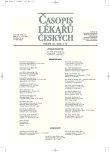Cognitive Dysfunction and Its Therapy
Kognitivní dysfunkce a její léčba – výzva pro 21. století
V úvodu je objasněn pojem kognice a kognitivní dysfunkce. Kognitivní dysfunkci nacházíme u řady neuropsychiatrických onemocnění. Nejvíce byla tato problematika studována u schizofrenie a demencí. Pro zkoumání kognitivní dysfunkce jsou zvláště vhodné iniciální fáze onemocnění , které se jeví optimální pro ověřování léčebných možností. Dále jsou shrnuty možnosti léčby kognitivní dysfunkce u schizofrenie. Základní léčbou jsou v současné době atypická antipsychotika. Zlepšení kognitivního deficitu atypickými antipsychotiky je statisticky signifikantní, avšak odraz v reálném životě je malý. Nová adjuvantní léčba má potenciál dále pozitivně ovlivnit kognitivní dysfunkci. Spočívá převážně v augmentaci neurotransmiterových systémů spojovaných s kognicí (glutamát, noradrenalin, serotonin, acetylcholin). Zlepšení kognitivní dysfunkce může zlepšit dlouhodobý průběh a funkční prognózu u nemocných se schizofrenní poruchou.
Klíčová slova:
kognitivní dysfunkce, schizofrenie, demence, atypická antipsychotika přídatná léčba, augmentace.
Authors:
E. Češková
Authors‘ workplace:
Psychiatrická klinika LF MU a FN, Brno
Published in:
Čas. Lék. čes. 2005; 144: 801-804
Category:
Review Article
Overview
In the first part the meaning of terms cognition and cognitive dysfunction is clarified. Cognitive dysfunction is found in many neuropsychiatric disorders. Majority of studies were done in patients with schizophrenia and dementia. For studying cognitive dysfunction, the most appropriate appear the initial phases of the disease. The next part of the study summarizes the treatment possibilities of cognitive dysfunction in schizophrenia. Atypical antipsychotics represent the basal treatment. The improvement of cognitive deficit by atypical antipsychotics is significant, but its importance in real life is small. The new add-on treatment has the potential for further improvement of cognitive dysfunction. This approach includes augmenting effects of neurotransmitters related to cognition (glutamate, noradrenalin, serotonin, acetylcholine). The improvement of cognitive dysfunction can improve the long-term outcome and functional prognosis in patients suffering from schizophrenic disorder.
Key words:
cognitive dysfunction, schizophrenia, dementia, atypical antipsychotics add-on treatment, augmentation.
Labels
Addictology Allergology and clinical immunology Angiology Audiology Clinical biochemistry Dermatology & STDs Paediatric gastroenterology Paediatric surgery Paediatric cardiology Paediatric neurology Paediatric ENT Paediatric psychiatry Paediatric rheumatology Diabetology Pharmacy Vascular surgery Pain management Dental HygienistArticle was published in
Journal of Czech Physicians

- Advances in the Treatment of Myasthenia Gravis on the Horizon
- Possibilities of Using Metamizole in the Treatment of Acute Primary Headaches
- Metamizole vs. Tramadol in Postoperative Analgesia
- Spasmolytic Effect of Metamizole
- Metamizole at a Glance and in Practice – Effective Non-Opioid Analgesic for All Ages
-
All articles in this issue
- Present View on the Stem Cell Plasticity and Cell Therapy
- Innate Immunity, Receptors for Exogenous and Endogenous Danger Patterns in Immunopathogenesis of Atherosclerosis – Part I: Identification of Danger Signals by Innate Immunity
- Innate Immunity, Receptors for Exogenous and Endogenous Danger Patterns in Immunopathogenesis of Atherosclerosis – Part II: TLR Receptors, Significance of Genetic Polymorphism of Danger Signals Receptors
- Molecular Diagnosis of Haemophilia A in Clinical Practice
- Cognitive Dysfunction and Its Therapy
- Non-melanocytic Dischromias
- Mosaicplasty in the Treatment of Knee Injuries
- Changes in Leptin, Leptin Receptor and Fatty Acids Levels During Chemoradiotherapy for Oesophageal Cancer
- Apoptosis of Urothelial Carcinoma Cells
- Renal Angiomyolipoma, Histology, Diagnostics and Therapy
- Glucocorticoids and their Effect on Dendritic Cell Function
- Combined Immunosuppressive Therapy in Patients with Pemphigus Vulgaris and Its Side Effects
- A Congenital Pulmonary Arteriovenous Fistula – A Case Report
- Brief Intervention for Alcohol Related Problems Can be Used at Various Environments
- Journal of Czech Physicians
- Journal archive
- Current issue
- About the journal
Most read in this issue
- Renal Angiomyolipoma, Histology, Diagnostics and Therapy
- Mosaicplasty in the Treatment of Knee Injuries
- Cognitive Dysfunction and Its Therapy
- Innate Immunity, Receptors for Exogenous and Endogenous Danger Patterns in Immunopathogenesis of Atherosclerosis – Part I: Identification of Danger Signals by Innate Immunity
